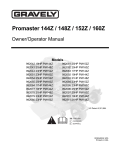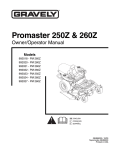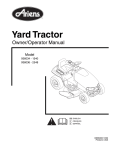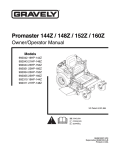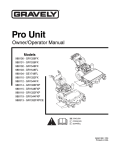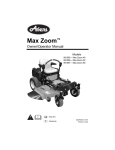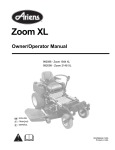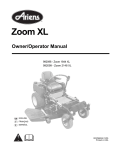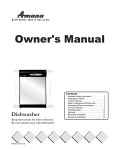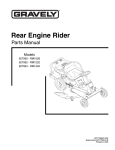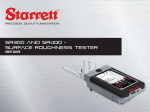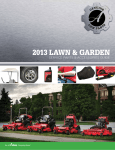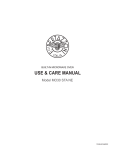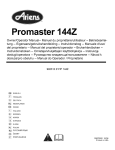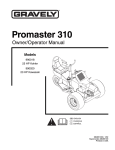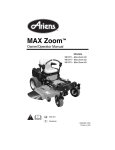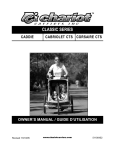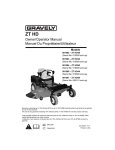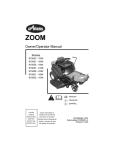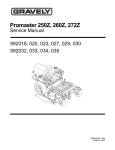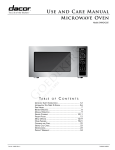Download Gravely 992066, 992067, 992068, 992069, 992070, 992071, 992072 Lawn Mower User Manual
Transcript
Promaster 252z / 260Z / 272Z Owner/Operator Manual Models 992066 - 25hp 52” 992067 - 25hp 60” 992068 - 27hp 60” 992069 - 28hp 60” 992070 - 25hp 72” 992071 - 27hp 52” 992072 - 27hp 72” US Patent 6,301,864 ENGLISH FRANÇAIS ESPAÑOL 00264600 1/04 Printed in USA CONTROLS AND FEATURES 1 2 3 20 4 6 7 23 8 10 22 5 11 21 9 12 19 14 17 16 15, 18 13 Figure 1 ENGLISH 1. Choke Control (Not on EFI* models) 2. Throttle Lever 3. Malfunction Indicator Light (EFI* models only) 4. Oil Pressure Indicator 5. Fuel Tanks and Caps 6. Steering Levers 7. Eye-QTM 8. Mower Lift Lever 9. Seat Suspension Adjustment Knob 10. Headlight 11. Seat Adjustment Lever 12. Fuel Shut Off Valve 13. Antiscalp Rollers 14. Axle Locks 15. Cylinder Stops 16. Height of Cut Indicator 17. Mower Deck with Chute Deflector 18. Cylinder Stop Storage Post 19. Foot Board Latch 20. Parking Brake 21. Power Take Off (PTO) Switch 22. Ignition Switch 23. Headlight Switch *Electronic Fuel Injection FRANÇAIS 1. Starter (indisponible sur les modèles EFI*) 2. Manette des gaz 3. Voyant d’anomalie (modèles EFI* modèles uniquement) 4. Indicateur de pression d'huile 5. Réservoirs de carburant et bouchons 6. Leviers de direction 7. Eye-QTM 8. Levier de relevage de la tondeuse 9. Levier de réglage de la suspension 10. Phare 11. Levier de réglage du siège 12. Robinet de carburant 13. Rouleaux anti-scalp 14. Verrouillage de l’essieu 15. Butées de vérin 16. Indicateur de hauteur de coupe 17. Carter de coupe avec déflecteur 18. Montant de remisage de butées de vérin 19. Attache du repose-pied 20. Frein de stationnement 21. Contacteur de régime de la PdF 22. Contacteur de démarrage 23. Commande des phares ESPAÑOL 1. Control de aire (no en modelos EFI*) 2. Palanca de ralentí 3. Lámpara indicadora de fallo (solamente modelos EFI*) 4. Indicador de la presión del aceite 5. Tapas y depósitos de combustible 6. Palancas de dirección 7. Eye-QTM 8. Palanca de elevación del cortacésped 9. Palanca de ajuste de la suspensión 10. Luces delanteras 11. Palanca de ajuste del asiento 12. Válvula de cierre de combustible 13. Rodillos antidesbroce 14. Trabas del eje 15. Topes de cilindro 16. Altura del indicador de corte 17. Plataforma de corte 18. Poste de almacenamiento del tope del cilindro 19. Traba de la plataforma de pie 20. Freno de estacionamiento 21. Interruptor de la toma de fuerza (TDF) 22. Interruptor de encendido 23. Interruptor de los faros delanteros *Inyección electrónica de combustible *Injection électronique WARNING The engine exhaust from this product contains chemicals known to the State of California to cause cancer, birth defects or other reproductive harm. 2 TABLE OF CONTENTS Controls and Features . . . . . . . . . . . . . . . . . . . . . 2 Storage . . . . . . . . . . . . . . . . . . . . . . . . . . . . . . . . 25 Safety . . . . . . . . . . . . . . . . . . . . . . . . . . . . . . . . . . . 5 Accessories . . . . . . . . . . . . . . . . . . . . . . . . . . . . 26 Assembly . . . . . . . . . . . . . . . . . . . . . . . . . . . . . . . 10 Troubleshooting . . . . . . . . . . . . . . . . . . . . . . . . . 25 Operation . . . . . . . . . . . . . . . . . . . . . . . . . . . . . . . 11 Service Parts . . . . . . . . . . . . . . . . . . . . . . . . . . . 26 Maintenance Schedule . . . . . . . . . . . . . . . . . . . . 14 Specifications. . . . . . . . . . . . . . . . . . . . . . . . . . . 27 Service and Adjustments . . . . . . . . . . . . . . . . . . 17 Warranty . . . . . . . . . . . . . . . . . . . . . . . . . . . . . . . 28 INTRODUCTION THE MANUAL PRODUCT REGISTRATION Before operation of unit, carefully and completely read your manuals. The contents will provide you with an understanding of safety instructions and controls during normal operation and maintenance. The Gravely dealer must register the product at the time of purchase. Registering the product will help the company process warranty claims or contact you with the latest service information. All claims meeting requirements during the limited warranty period will be honored, whether or not the product registration card is returned. Keep a proof of purchase if you do not register your unit. All reference to left, right, front, or rear are given from operator sitting in the operation position and facing the direction of forward travel. SERVICE AND REPLACEMENT PARTS Transfer model & serial number label from product registration here. When ordering publications, replacement parts, or making service inquiries, know the Model and Serial numbers of your unit and engine. Numbers are located on the product registration form in the unit literature package. They are printed on a serial number label, located on the frame of your unit (Figure 2). Serial Number Label Customer Note: If Dealer does not register your product, please fill out, sign and return the product registration card to Gravely. UNAUTHORIZED REPLACEMENT PARTS Use only Gravely replacement parts. The replacement of any part on this equipment with anything other than a Gravely authorized replacement part may adversely affect the performance, durability, and safety of this unit and may void the warranty. Gravely disclaims liability for any claims or damages, whether regarding warranty, property damage, personal injury or death arising out of the use of unauthorized replacement parts. NOTE: To locate your nearest Gravely Dealer, call 1-800-472-8359 or go to www.gravely.com on the internet. DISCLAIMER OF3510 Figure 2 • Record Unit Model and Serial numbers here. Gravely reserves the right to discontinue, change, and improve its products at any time without public notice or obligation to the purchaser. The descriptions and specifications contained in this manual were in effect at printing. Equipment described within this manual may be optional. Some illustrations may not be applicable to your unit. DEALER DELIVERY Dealer should: • Record Engine Model and Serial numbers here. 1. Test brakes after tractor is assembled to be sure adjustment has not been disturbed in shipment (See Parking Brake Interlock System on page 11). Wheel brakes are properly adjusted at factory. GB - 4 Copyright 2002 Ariens Company 2. Check the safety interlock system to make sure that it is functioning properly. With operator on seat, unit must not start unless steering levers are in neutral (N) and Power Takeoff (PTO) is disengaged (Off). Engine must stop if operator leaves seat when steering levers are in any drive position or PTO is engaged (On). See Safety Interlock System on page 11. 3. Fill out Original Purchaser Registration Card and return the card to Gravely. 4. Explain Gravely Limited Warranty Policy. Instruct customer on controls and operation of unit. Discuss and emphasize the Safety Precautions. Give customer Owner/Operator, Parts, and Engine Manuals. Advise customer to thoroughly read and understand them. Customer Note: Your Dealer has been provided complete set-up and preparation instructions which must be completed prior to you taking delivery of this unit. The dealer is required to review important information in this manual with you before or upon delivery of the unit or attachment. 5. Explain recommended lubrication and maintenance. Advise customer on adjustments. SAFETY WARNING: This cutting machine is capable of amputating hands and feet and throwing objects. Failure to observe the safety instructions in the manuals and on decals could result in serious injury or death. WARNING: POTENTIALLY HAZARDOUS SITUATION! If not avoided, COULD RESULT in death or serious injury. CAUTION: POTENTIALLY HAZARDOUS SITUATION! If not avoided, MAY RESULT in minor or moderate injury. It may also be used to alert against unsafe practices. Slopes are a major factor related to loss-of-control and tip-over accidents. Operation on all slopes requires extra caution. Tragic accidents can occur if the operator is not alert to the presence of children. Never assume that children will remain where you last saw them. Gasoline is extremely flammable and the vapors are explosive, handle with care. Disengage attachment, stop unit and engine, remove key, engage parking brake, and allow moving parts to stop before leaving operator’s position. SAFETY ALERT SYMBOL These are safety alert symbols. They mean: •ATTENTION! OL1253 •YOUR SAFETY IS INVOLVED! When you see this symbol: •BECOME ALERT! •OBEY THE MESSAGE! OL3900 NOTATIONS NOTE: General reference information for proper operation and maintenance practices. IMPORTANT: Specific procedures or information required to prevent damage to unit or attachment. PRACTICES AND LAWS Practice usual and customary safe working precautions, for the benefit of yourself and others. Understand and follow all safety messages. Be alert to unsafe conditions and the possibility of minor, moderate, or serious injury or death. Learn applicable rules and laws in your area, including those that may restrict the age of the operator. REQUIRED OPERATOR TRAINING Original purchaser of this unit was instructed by the seller on safe and proper operation. If unit is to be used by someone other than original purchaser (loaned, rented or sold), ALWAYS provide this manual and any needed safety training before operation. SIGNAL WORDS The safety alert symbols above and signal words below are used on decals and in this manual. Read and understand all safety messages. DANGER: IMMINENTLY HAZARDOUS SITUATION! If not avoided, WILL RESULT in death or serious injury. GB - 5 SAFETY DECALS AND LOCATIONS ALWAYS replace missing or damaged Safety Decals. Refer to Figure 3 for Safety Decal locations. 7 07735200C DANGER / PELIGRO Avoid injury - Stay clear of rotating parts. Risque de blessures - ne pas sapprocher des pièces en mouvement. Evitar lesiones - Mantenerse alejado de las piezas giratorias. 3 6 DANGER/PELIGRO 077560 5 07731400D 4 WARNING/AVERTISSEMENT/ADVERTENCIA 4 Do not operate mower unless guards are in operating position or bagger is attached. 07742300B Ne jamais utiliser la tondeuse sans protecteur sur le canal d'ejection ou sans le bac monte. No operar segadora a menos que las defensas esten en posicion de operacion o el recogedor este fijo. 1 DANGER / PEL I GRO 2 3 17 DANGER / PELIGRO TO AVOID SERIOUS INJURY OR DEATH Read the operator's manual. Keep children and others away from unit while operating. Never direct discharge toward other people. Thrown objects can cause injury. Look down and behind before and while backing. Never carry children. Go up and down slopes, not across. If machine stops going uphill, stop blade and back down slowly. Avoid sudden turns. Keep safety devices (guards, shields, switches, etc.) in place and working. Check interlock system per manual before use. Understand location and function of all controls. Never allow operation by untrained persons. 05359400 POUR EVITER LES BLESSURES GRAVES OU LA MORT Lire le manuel d'utilisation. Éloigner les engants et tout autre personne pendant le fonctionnement de la machine. Ne jamais décharger directement en direction de quelquun. Des particules projetées peuvent provoquer des blessures. Regardez derriere et sur les cotes lorsque vous reculez. Ne transportez jamais dénfant. Tondez toujours de haut en bas et inversement jamais le long des pentes. Si la machine sárrete en montee. Debrayez la lame et redescendez doucement. Evitez les virages brusques. Maintenez toujours en place tous les elements de securite (protecteurs, interrupteurs, etc.). Controlez le bon fonctionnement des interrupteurs de securité avant utilisation tel q'uindiqué dans le manuel d'utilisation. Comprenez bien la fonction et la situation de chacun des leviers et boutons de commande. Never allow operation by untrained persons. MAX PARA EVITAR DAÑOS SERIOS O LA MUERTE Leer el manual del operador. Mantenga la unidad alejada de los niños u otras personas cuando esté en funcionamiento. Nunca dirija la descarga hacia otras personas, ya que los objetos lanzados pueden provocar lesiones. Antes y durante retroceso mirar hacia abajo y detras. Nunca monten niños. Suba y baje pendientes, no transversalmente. Si la maquina se detiene subiendo cuesta, desactive la cuchilla y baje lentamente. Evite viradas subitas. Mantenga artefactos de seguridad (defensas, protectores, interruptores, etc.) en su lugar y trabajando. Verifique en el manual el sistema de engranar antes de usar. Tenga conocimiento de funciones y localizaciones de todos los controles. Never allow operation by untrained persons. 07731400D 07734700D Figure 3 OF3390 1. DANGER! TO AVOID SERIOUS INJURY OR DEATH Keep children out of work area and under watchful care of a responsible adult. Read Owner/Operator Manual. OL4470 NEVER CARRY CHILDREN. OL1801 Keep children and others away from unit while operating. OL4480 Go up and down slopes, not across. DO NOT operate on slopes over 17°. OL4370 MAX Never direct discharge toward other people. Thrown objects can cause injury. Remove objects that could be thrown by the blade. 17° OL4450 • If machine stops going uphill, stop blade and back down slowly. OL0910 • Avoid sudden turns. Look down and behind before and while backing. • Keep safety devices (guards, shields, switches, etc.) in place and working. • Check interlock system per manual before use. OL4460 • Understand location and function of all controls. • Never allow operation by untrained persons. GB - 6 2. PINCH POINT 7. DANGER! Avoid pinch points. AVOID INJURY. Stay clear of rotating parts. OL4730 OF3330 SAFETY RULES 3. DANGER! ROTATING PARTS Read, understand, and follow all safety practices in Owner/Operator Manual before beginning assembly. Failure to follow instructions could result in personal injury and/or damage to unit. Always keep feet and hands away from rotating parts. OL3030 Always stand clear of discharge area. Do not direct discharge toward other people. ALWAYS remove key and/or wire from spark plug before assembly. Unintentional engine start up can cause death or serious injury. Complete a walk around inspection of unit and work area to understand: • Work area • Your unit • All safety decals OL0910 Keep people away from unit while operating. ALWAYS check overhead and side clearances carefully before operation. ALWAYS be aware of traffic when operating along streets or curbs. Keep children and people away. OL3292 Shut off engine, remove key, read manual before you adjust or repair unit. Keep children out of work area and under watchful care of a responsible adult. Keep area of operation clear of all toys, pets, and debris. Thrown objects can cause injury. OL4010 NO STEP! Always keep feet away from rotating parts. OL4420 4. WARNING! Always stand clear of discharge area. OL4430 Do not operate mower unless bagger is attached or guards are in operating position. OL3320 5. HOT SURFACES! DO NOT touch parts which are hot from operation. ALWAYS allow parts to cool. Check for weak spots on docks, ramps or floors. Avoid uneven work areas and rough terrain. Stay alert for hidden hazards or traffic. DO NOT operate near drop offs, ditches, or embankments. Unit can suddenly turn over if a wheel is over the edge of a cliff or ditch, or if an edge caves in. Data indicates that operators, age 60 and above, are involved in a larger percentage of riding mower related injuries. These operators should evaluate their ability to operate the riding mower safely enough to protect themselves and others from serious injury. Read the entire Owner/Operator manual and other training material. If the operator or the mechanic cannot read the manual, it is the owner’s responsibility to explain it to them. Only the user can prevent and is responsible for accidents or injuries occurring to themselves, other people or property. Only trained adults may operate or service unit. Local regulations may restrict the age of the operator. Training includes actual operation. NEVER allow children to operate or play on or near unit. Be alert and shut off unit if children enter area. OS0731 6. ROTATING PARTS AVOID INJURY. Stay clear of rotating parts. NEVER operate unit after or during the use of medication, drugs or alcohol. Safe operation requires your complete and unimpaired attention at all times. DO NOT wear loose clothing or jewelry and tie back hair that may get caught in rotating parts. OF3450 Wear adequate outer garments. GB - 7 NEVER wear open sandals or canvas shoes during operation. Wear adequate safety gear, protective gloves and footwear. Wear proper footwear to improve footing on slippery surfaces. DO NOT try to stabilize the machine by putting your foot on the ground. Never direct discharge towards persons or property that may be injured or damaged by thrown objects. Use extreme caution on gravel surfaces. Always stand clear of the discharge area. Always wear safety goggles or safety glasses with side shields when operating mower. ALWAYS disengage PTO, stop unit and engine, remove key, engage parking brake and allow moving parts to stop before leaving operator’s position. Moving parts can cut or amputate fingers or a hand. Wrap blade(s) or wear gloves to service. On multiblade mowers, rotation of one blade will cause all blades to rotate. Never engage PTO while raising attachment or when attachment is in raised position. NEVER place your hands or any part of your body or clothing inside or near any moving part while unit is running. DO NOT operate at too fast a rate. DO NOT change engine governor settings or over-speed engine. Slow down before turning. ALWAYS keep hands and feet away from all rotating parts during operation. Rotating parts can cut off body parts. DO NOT operate in reverse unless absolutely necessary. ALWAYS look down and behind before and while backing. ALWAYS keep body and hands away from pin holes or nozzles which eject hydraulic fluid under pressure. If equipment vibrates abnormally, stop engine at once, wait for moving parts to stop and remove wire from spark plug. Repair any damage before restarting unit. DO NOT touch parts which are hot. Allow parts to cool. Take all possible precautions when leaving unit unattended. Shut off engine. Remove wire from spark plug and secure it away from spark plug. ALWAYS keep hands and feet away from all pinch points. Fumes from the engine exhaust can cause death or serious injury. DO NOT run engine in an enclosed area. Always provide good ventilation. ALWAYS remove key to prevent unauthorized use. Know the weight of loads. Limit loads to those you can safely control and the unit can safely handle. Read, understand, and follow all instructions in the manual and on the machine before starting. • How to operate all controls Disengage PTO when attachment is not in use. ALWAYS turn off power to attachment when travelling, crossing driveways, etc. • The functions of all controls Mow up and down slopes, not across them. • How to STOP in an Emergency DO NOT operate on slopes of more than 17 degrees. • Braking and steering characteristics Use of a Rollover Protection System (ROPS) is recommended for slope operation. See Accessories on page 26. Understand: • Turning radius and clearances Keep safety devices or guards in place and functioning properly. NEVER modify or remove safety devices. Always wear a seat belt when operating unit using a Rollover Protection System (ROPS). Ensure Safety Interlock System is functioning properly. DO NOT operate unit if safety interlock is damaged or disabled. Keep all movements on the slope slow and gradual. Do not make sudden changes in speed or direction. Start and operate unit only when seated in operator’s position. Steering control levers must be in neutral, PTO disengaged and parking brake set when starting engine. Use care when approaching blind corners, shrubs, trees or other objects that may obscure vision. Dust, smoke, fog, etc. can reduce vision and cause an accident. Mow only in daylight or good artificial light. Avoid slippery surfaces. Always be sure of your footing. DO NOT mow on wet grass. Reduced traction could cause sliding and effect the machine’s stability. Watch for traffic when operating near or crossing roadways. Never carry passengers. Avoid starting or stopping on the slope. If tires lose traction, disengage the blades and proceed slowly straight down the slope. If you cannot back up a slope or you feel uneasy on it, do not mow it. DO NOT park on slopes unless necessary. When parking on slope always chock or block wheels. Always engage parking brake. Use a slow speed. Tires may lose traction on slopes even though the brakes are functioning properly. Do not bypass transmission when on a slope. Use extra care when loading or unloading unit onto trailer or truck. GB - 8 Secure unit chassis to transport vehicle. NEVER secure from rods or linkages that could be damaged. Keep nuts and bolts tight, especially blade attachment bolts, and keep equipment in good condition. DO NOT transport machine while engine is running. NEVER attempt to make any adjustments to unit while engine is running (except where specifically recommended). Stop engine, remove key or spark plug wire and wait for all moving parts to stop before servicing or cleaning. ALWAYS turn off power to attachment when transporting. Keep unit free of debris. Clean up oil or fuel spills. This product is equipped with an internal combustion type engine. DO NOT use unit on or near any unimproved, forest-covered or brush covered land unless exhaust system is equipped with a spark arrester meeting applicable local, state or federal laws. A spark arrester, if it is used, must be maintained in effective working order by operator. Fuel is highly flammable and its vapors are explosive. Handle with care. Use an approved fuel container. Check parking brake operation frequently. Adjust and service as required. ALWAYS maintain unit in safe operating condition. Damaged or worn out muffler can cause fire or explosion. NO smoking, NO sparks, NO flames. ALWAYS allow engine to cool before servicing. Maintain or replace safety and instructions labels, as necessary. NO smoking, NO sparks, NO flames. ALWAYS allow engine to cool before servicing. NEVER store unit with fuel in fuel tank, inside a building where any ignition sources are present. NEVER fill fuel tank when engine is running or hot from operation. Shut off fuel and allow engine to cool completely before storing in closed area or covering unit. NEVER fill or drain fuel tank indoors. Replace fuel cap securely and clean up spilled fuel. Never fill containers inside a vehicle or on a truck or trailer bed with a plastic liner. Always place containers on the ground away from your vehicle before filling. When practical, remove gas-powered equipment from the truck or trailer and refuel it on the ground. If this is not possible, then refuel such equipment on a trailer with a portable container, rather than from a gasoline dispenser nozzle. Keep the nozzle in contact with the rim of the fuel tank or container opening at all times until fuelling is complete. Do not use a nozzle lock-open device. Clean grass and debris from unit, especially from around muffler and engine, to help prevent fires. For extended storage, shut off fuel and clean unit thoroughly. See engine manual for proper storage. Lower cutting deck unless a positive mechanical lock is used. Use only attachments or accessories designed for your unit. Check attachment components frequently. If worn or damaged, replace with manufacturer’s recommended parts. If fuel is spilled on clothing, change clothing immediately. Avoid Electric Shock. Objects contacting both battery terminals at the same time may result in injury and unit damage. DO NOT reverse battery connections. Explosive Gases from battery can cause death or serious injury. Poisonous battery fluid contains sulfuric acid and its contact with skin, eyes or clothing can cause severe chemical burns. No flames, No sparks, No smoking near battery. ALWAYS wear safety glasses and protective gear near battery. DO NOT TIP battery beyond a 45° angle in any direction. ALWAYS keep batteries out of reach of children. Battery posts, terminals and related accessories contain lead and lead compounds, chemicals known to the State of California to cause cancer and reproductive harm. Wash hands after handling. ALWAYS block wheels and know all jack stands are strong and secure and will hold weight of unit during maintenance. Release pressure slowly from components with stored energy. GB - 9 ASSEMBLY 6. Battery - Remove battery from unit and charge (See Battery on page 19). WARNING: AVOID INJURY. Read and understand entire Safety section before proceeding. 7. Check Engine Crankcase - To access engine, open hood. Check and add oil if needed. See Engine Manual for specifications. UNIT ASSEMBLY 8. 60" and 72" Decks - Remove, reverse, and reinstall discharge chute and mounting bracket. Package Contents: Unit, Mower Deck and Literature Pack WARNING: Discharge chute must pivot freely. DO NOT overtighten the pivot bolts. Preparation Checklist Refer to the Owner/Operator manual as required. 9. Fill Engine Fuel Tank - Add clean fuel to the fuel tank. 1. Unpack Unit - Remove shrink wrap and packaging materials. 2. Remove Unit From Container - Open Bypass Valves (dump valves) (See Moving the Unit with the Engine Off on page 14). Push unit from container onto a level surface. Close the dump valves. IMPORTANT: Refer to Engine Manual for fuel type. 10. Hardware - Check for loose hardware. 11. Check Safety Interlock System - Check to see that the interlock system operates correctly (See Safety Interlock System on page 11). 3. Tires - Adjust tire pressure for front tires: 20-25 PSI (138-172 kN/m2), rear tires: 12-15 PSI (83-103 kN/m2). 4. Position and Attach Seat - Remove nuts from seat studs in hood frame. Lift and rotate seat onto hood frame. Secure with nuts. 5. Position Steering Levers - Remove bolts and spacers from steering rod. Flip the steering levers into operating position. Reinstall spacers, bolts and nuts. Tighten hardware securely. See Figure 4. WARNING: FAILURE OF INTERLOCK together with improper operation can result in severe personal injury. 12. Lubrication - Lubricate all fittings per maintenance label under seat and check hydrostat oil level (See Lubricate Unit on page 20). 13. Level Deck - Check unit to assure deck level set at factory has been maintained (See Leveling the Mower Deck on page 24). 14. Check Function of all Controls - Ensure unit runs and performs properly. 3 WARNING: FAILURE OF CONTROLS could result in death or serious injury. 2 2 1. Steering Lever in Shipping Position 2. Spacers and Hardware 3. Steering Lever in Operation Position 1 OF3520 Figure 4 GB - 10 OPERATION Steering Levers WARNING: AVOID INJURY. Read and understand entire Safety section before proceeding. A B C D CONTROLS AND FEATURES See Figure 1 for Controls and Features locations. Safety Interlock System 077348A WARNING: Safety interlock system failure and improper operation of unit can result in death or serious injury. Test this system each time the unit is operated. If this system does not function as described, do not operate until repairs are made. The steering levers control speed and direction. In addition, they will stop the unit. A. For reverse travel, pull both steering control levers backward. B. For straight forward travel, push both steering control levers forward. Perform the following tests to ensure the safety interlock system is working properly. If the unit does not perform as stated, contact your Gravely dealer for repairs. C. To turn left, pull the left back or push the right steering control lever forward or a combination of both. NOTE: When the parking brake is engaged, the steering levers are locked in neutral. D. To turn right, pull the right back or push the left steering control lever forward or a combination of both. Test Steering PTO Parking Engine Levers Brake STARTING INTERLOCK 1 Neutral Off Engaged Starts 2 Neutral On Engaged Doesn’t Start 3 Neutral Off Disengaged Doesn’t Start OPERATING INTERLOCK (ENGINE ON) 4* Neutral On Engaged Shuts Off 5* Neutral Off Disengaged Shuts Off * Operator lifts off seat. To stop, return both steering levers to neutral. NOTE: The steering controls are mechanically locked in neutral whenever the parking brake is engaged. NOTE: Aggressive turning can scuff or damage lawns. ALWAYS keep both wheels rotating when making sharp turns. DO NOT make turns with inside wheel completely stopped. To obtain minimum turning radius, slowly reverse inside wheel while moving outside wheel slowly forward. Ignition Switch 3 Parking Brake Interlock System With the parking brake engaged, the steering levers must be locked in neutral. With the parking brake disengaged, the engine must not start and the engine must shut off if the operator leaves the seat. Eye-Q 2 1 OF1751 Operate the ignition switch with the removable key. The switch has three positions: Off (1), On (2) and Start (3). To start the engine, turn the key to Start, then release to On. To stop the engine, turn the key to Off. Choke Control (Not on EFI models) TM Push the choke lever forward to start a cold engine. Pull the choke lever to the rear when the engine gets warm. Monitors equipment performance, operator performance, and equipment maintenance. See Eye-Q Owner’s Manual for how to access these features. OF1680 GB - 11 Throttle Lever 1 Fuel Shut-Off Valve The throttle lever changes the engine speed. Move the throttle lever to Fast (1) to increase engine speed. Move the lever to Slow (2) to decrease engine speed. OFF LEFT TANK RIGHT TANK OF1881 Use this valve to control fuel flow from left or right fuel tank. Open the valve to operate the engine. Turn the valve to "Off" when storing or transporting the unit. NOTE: Fuel shut-off valve on EFI units does not have an "Off" position. Parking Brake Lever 1. Pull lever up to engage parking brake. 2. Push lever down to disengage parking brake. 2 OF1700 OF1740 Power Take Off (PTO) Switch ON Power take off (PTO) switch engages and disengages the mower blades. Seat Adjustments WARNING: Make all seat adjustments with unit stationary, parking brake engaged and engine shut off. Pull the power take off (PTO) switch to "On" position to engage mower blades. OFF OE0261 Push the power take off (PTO) switch to "Off" position to disengage mower blades. To adjust seat forward or backward: 1. While seated, pull seat adjustment lever outward and slide seat into desired position. NOTE: The engine will not start unless the steering control levers are in the neutral position, the PTO switch is in the “Off” position and parking brake is engaged. Mower Lift Lever Use the mower lift lever, located on the left side of tractor, to raise and lower the mower deck. Pull the lever rearward to raise or push the lever forward to lower the mower deck. 2. Release lever and slide seat forward or back to lock seat into position. To adjust seat suspension: • To make seat more firm turn knob clockwise. To make seat less firm turn knob counter clockwise. Turn knob several turns at a time until desired position is achieved. Engine Oil Pressure Indicator Release lever to hold the mower deck in selected position. OG0601 The cutting height indicator on the right lift cylinder shows the approximate cutting height in inches. OF1700 Cylinder Stops The cylinder stops ensure the same cutting height after raising the deck to clear an obstacle. Store the stops on the post behind the hydraulic lift cylinder. The stops come in two (2) sizes, 1/4" (.64 cm) and 1/2" (1.27 cm). 1. Remove the cylinder stops from the post and snap onto the lift cylinder rod. 2. Push the lift lever forward until the cylinder rests against the cylinder stops. Indicator lights up “Red” if the oil pressure is low. Check oil level and add if necessary. Refer to engine manual. Malfunction Indicator Light (EFI models only) The malfunction indicator light flashes when there is a problem with the electronic fuel injection system. When OD0190 indicator light flashes, disengage PTO, shut off engine, remove key and see engine manual. Axle Locks For a solid front axle, install axle locks on front axle. For a pivoting front axle, remove axle locks from front axle and store on unit. Headlights Push headlight switch to ON position to turn ON headlights. Push headlight switch to OFF position to turn OFF headlights. GB - 12 FILLING FUEL TANK 1. Make sure the steering levers are in neutral. 2. Put the PTO switch in the “Off” position. WARNING: AVOID INJURY. Read and understand entire Safety section before proceeding. 3. Engage parking brake. 4. For models with choke: If the engine is cold, move the choke control to the “On” position. If the engine is warm or hot, do not use choke. Add fuel to Fuel Tank as needed. See your Engine Manual for correct type and grade of fuel. 5. Move the throttle to 3/4 “Fast” position. See Engine Manual for detailed instructions. To add fuel to the fuel tank: 1. Place unit in an open or well-ventilated open area. 6. Put the ignition key in the switch and turn it to the “Start” position. 2. Stop the engine. 3. Clean the fuel cap and the area around the fuel cap to prevent dirt from entering the fuel tank. Remove the cap from the fuel tank. 7. As soon as the engine starts, release the key. 8. For models with choke: Move the choke control to the “Off” position from the “Choke” position. Wait until the engine is running smoothly before operation. 4. Fill the fuel tank to within 1" (25 mm) below bottom of filler neck. 5. Replace fuel cap and tighten. 6. Clean up any spilled fuel. To stop the engine: 1. Bring the steering levers to neutral. Disengage the PTO and engage the parking brake. PRE-START 2. Move the throttle lever to the “Slow” position. CAUTION: Make sure all hardware is tight, all safety devices are in place and all adjustments are made correctly. 1. Check Safety Interlock System If this system does not function as described do not operate until repairs are made. 3. Turn the ignition key to the “Off” position. TO MOW WITH UNIT Operate the unit only when seated in the operator’s position. 1. Start the engine. Let the engine warm until it is running smoothly. 2. Check Air Cleaner 2. Release parking brake. Check air filter for dirt. Clean as required. See Maintenance Section. WARNING: Move the steering control levers slowly and keep the throttle control lever at slow speed until you learn how to operate the unit. 3. Check Engine Fuel and Crankcase Oil Check and add fuel if required. Check that engine crankcase oil is full. Refer to Maintenance Section. 3. Bring the steering levers to neutral. 4. Check Tire Pressure 4. Slow the engine down to about 3/4 speed. 5. Check Hydraulic Fluid Level 5. Turn ON the PTO switch to engage the mower. 6. Adjust Seat Be sure all controls can be reached safely from operator’s position. IMPORTANT: Never engage the PTO if the mower is plugged with grass or other material. This may cause damage to the electric clutch. 6. Move throttle control to fast. 7. Move the steering levers forward to obtain a slow ground speed. STOPPING IN AN EMERGENCY The unit can be stopped immediately at any time by turning the ignition key to the "Off" position. 8. To disengage the mower, move the PTO switch to the “Off” position. STARTING AND SHUT OFF CAUTION: Read entire Owner/Operator Manual, Clutch Manual, and Engine Manual first. 9. When you know how to operate the unit, select a speed appropriate to your mowing conditions. PARKING To park the unit: DO NOT attempt to start engine at this time. 1. Bring the steering levers to neutral. Turn off PTO. 2. Move the throttle lever to the “Slow” position. To start the engine: 3. Engage the parking brake. GB - 13 4. Lower the attachment. 5. Turn the ignition key to the “Off” position and remove the key. 2 Front of unit MOVING THE UNIT WITH THE ENGINE OFF IMPORTANT: Never tow unit. 1 1. Shut OFF engine. 2. Place seat in the service position. See Service Positions on page 17. 1. Left Bypass Valve Lever 2. Right Bypass Valve Lever 3. Turn right and left bypass valve levers counter clockwise 1/2 turn (Figure 5). WARNING: Do not bypass transmission when on a slope. Figure 5 OF3530 4. Disengage parking brake. 5. Push unit to desired location. FOR BEST PERFORMANCE 6. Engage parking brake. Cut grass when it is dry. 7. Turn bypass valve levers clockwise 1/2 turn. Keep mower blades sharp. Keep mower deck properly leveled. Adjust anti-scalp rollers to prevent scalping. Do not set height of cut too low. For very tall grass, mow twice. Do not travel too fast. Mow with the engine set at full throttle. When mulching, only remove 1/3 of grass length per cutting. Discharge clippings into areas already cut. Vary cutting pattern with each mowing. Do not allow grass or debris to collect inside of mower deck. Clean after each use. MAINTENANCE SCHEDULE WARNING: AVOID INJURY. Read and understand entire Safety section before proceeding. Proper maintenance can prolong the life of unit. The following charts show the recommended service schedule. More frequent service may be required due to working conditions (heavy loads, high ambient temperatures, dusty conditions, or airborne debris). See the maintenance instructions in the Engine Manual for additional information. NOTE: Use Figure 6 for maintenance item locations. GB - 14 Kohler Engine 1 2 3 Kawasaki Engine 5 4 9 5 6 3 7 7 8 9 1. Hydraulic Fluid Cap/Dipstick 2. Hydraulic Fluid Tank 3. Oil Fill/Dipstick 4. Battery Period 5. 6. 7. 8. 9. In-Line Fuel Filter Oil Drain Petcock Oil Filter EFI Fuel Filter Air Filter Service 6 Task Check Safety Interlock Each Use Every 25 Hours Every 50 Hours OF3540 OF3550 Figure 6 WARNING: Safety interlock system failure and improper operation of unit can result in death or serious injury. Test this system each time the unit is operated. If this system does not function as described, do not operate until repairs are made. See Safety Interlock System on page 11. Check Parking Brake Interlock System See Parking Brake Interlock System on page 11. Check Engine Oil Check oil level on dipstick (item 3). Add more oil through the engine oil fill cap if needed. See engine manual for detailed instructions. Check Air Filter Check the air cleaner element (item 9) before each use. See engine manual for detailed instructions. Check Hydraulic Fluid Check hydraulic oil level mark on cap/dipstick (item 1). Add 15W50 Synthetic oil as needed. Do not overfill. See Hydraulic Fluid on page 17. Check Tires See Specifications on page 27 for correct tire pressure. Check Mower Blades Check mower blades for wear. Sharpen or replace as needed. See Mower Blades on page 18. Clean Air Filter Outer Element (992066, 067, 070) Clean the outer filter element (item 9). Replace as needed. Refer to engine manual for detailed instructions. Lubricate Unit Oil all pivot points and pin connections. Grease lube fittings. See Lubricate Unit on page 20. GB - 15 Period Every 100 Hours Every 200 Hours Every 250 Hours Every 500 Hours Every 1,500 Hours Service Task Clean Battery Keep battery (item 4) and its terminals clean. See Clean Battery on page 19. Change Engine Oil Drain oil by opening oil drain petcock (item 6) on right side of unit. Refer to engine manual for detailed instructions. Clean Air Filter Inner Element (992066, 067, 070) Clean the inner filter element (item 9). Check Fasteners Check mower blade mounting hardware and all other fasteners. Replace missing or damaged fasteners. Tighten all nuts and bolts to their correct torque value. Check Belts Replace worn or deteriorated belts. See Replacing Mower Belts on page 22 and Replacing the Hydro Pump Belt on page 23. Change Fuel Filter Change in-line fuel filter (item 5). Refer to engine manual for detailed instructions. Change Oil Filter Change oil filter (item 7). Refer to engine manual for detailed instructions. Replace Air Filter Inner Element (992066, 067, 070) Replace the inner filter element (item 9). Refer to engine manual for detailed instructions. Replace Air Filter Outer Element (992068, 069, 071, 072) Replace the outer filter element (item 9). Refer to engine manual for detailed instructions. Change Hydraulic Fluid and Filter Drain hydraulic fluid tank (item 2), replace hydraulic oil filter, refill system. See Change Hydraulic Fluid and Filter on page 18. Replace Air Filter Inner Element (992068, 069, 071, 072) Replace the inner filter element (item 9). Refer to engine manual for detailed instructions. Change EFI Fuel Filter (992069 only) Replace canister fuel filter (item 8) on frame. Refer to engine manual for detailed instructions. GB - 16 SERVICE AND ADJUSTMENTS Gravely Dealers will provide any service which may be required to keep your unit operating at peak efficiency. Should engine service be required, it can be obtained from a Gravely Dealer or the engine manufacturer’s authorized service center. 1 2 8 WARNING: AVOID INJURY. Read and understand entire Safety section before proceeding. 3 6 7 4 5 CAUTION: HOT SURFACES may result in injury. DO NOT touch engine or drive parts which are hot from operation. Allow parts to cool before servicing. SERVICE POSITIONS 1. Place unit on a flat level surface. ALWAYS stop engine. Ensure unit is secure and will not tip over. Strap and clamp onto lift if used. OF3560 1. 2. 3. 4. 2. Place steering levers in neutral position and engage parking brake. Daily Service Position Full Service Position Steering Levers Parking Brake 5. 6. 7. 8. Engine Service Slot Engine Hood Prop Rod Engine Hood & Frame Figure 7 3. Unhook hood latches. 4. Firmly grasp engine frame and cover. Lift to desired service position (Figure 7). HYDRAULIC FLUID WARNING: HYDRAULIC FLUID can result in severe burns. Fluid in hydraulic system can penetrate skin and result in serious injury or death. CAUTION: WHEN OPENING ENGINE COVER, USE CARE TO PROPERLY ENGAGE PROP INTO SLOT. Be sure footing is secure to accomodate weight shift of hood when rotating to full service position. Be sure to stop the engine before doing any work on hydraulic parts. Daily Service Position: Place engine hood prop rod into service slot. Assure rod is engaged in slot properly. Full Service Position: Slowly release frame after seat contacts foot board. Use care and be sure of your footing. Do not step on mower deck. Keep body and hands away from pin holes or nozzles which expel hydraulic fluid when under pressure. Use paper or cardboard, not hands, to search for leaks. Ensure all hydraulic fluid connections are tight and all hydraulic hoses and lines are in good condition before applying pressure to system. 5. When service is complete, lower hood and secure with latches. FOREIGN FLUID INJECTED INTO BODY can result in gangrene. Fluid must be surgically removed within a few hours by a doctor familiar with this form of injury. Check Hydraulic Fluid Level FULL Mark Operating Range OE0380 1. Shut OFF engine. Engage parking brake. Remove the ignition key. GB - 17 Discard mower blade if: 2. Put seat in service position. 3. Remove any dirt that may be around the cap/dipstick on the hydraulic reservoir. • More than 1/2 in. (1.27 cm) of metal is removed. • Air lifts become eroded. 4. Remove cap/dipstick. • Blade is bent or broken. 5. Check hydraulic oil level mark on cap/dipstick. 2. Sharpen mower blade by removing an equal amount of material from each end of mower blade. DO NOT change angle of cutting edge or round the corner of the mower blade. 6. Add 15W50 Synthetic oil as needed. Do not overfill. Change Hydraulic Fluid and Filter Change the hydraulic oil filter and hydraulic oil every 500 hours. Use Mobil 15W50 synthetic oil for best component life. 3. Check mower blade balance. Slide mower blade on an unthreaded bolt. A balanced blade should remain in a horizontal position. If either end of mower blade moves downward, sharpen the heavy end until blade is balanced. 1. Clean around dipstick cap and dipstick. Remove dipstick. 2. Place container under oil filter to catch oil. 3. Remove oil filter. 4. Install mower blade(s) on unit. 4. Allow tank to drain. 5. Tighten the bolts to a torque of 115-120 lbf-ft (156-162.6 N•m). 5. Lubricate rubber gasket on new oil filter with clean hydraulic oil. DO NOT Sharpen to This Pattern 6. Spin new oil filter onto filter housing until it makes contact. Tighten oil filter another 1/2 turn. 2 1 7. Add new oil to the oil tank. It will take about 4 quarts. Use Mobil 15W50 synthetic oil for best pump and wheel motor life. 8. Properly dispose of waste oil. MOWER BLADES Remove CAUTION: Use sturdy gloves or padding to protect hands when working with mower blades. DISCARD if More Than 1/2 in. (1.27 cm) 4 1 1. Turn the engine off. Remove the ignition key. Remove the ignition wire from the spark plugs. 2. Remove the bolts, lock washer, flat washers, and blades from the spindle shafts. Replace 1. Put the blades, flat washers, lock washers, and the bolts back on the spindle shafts. 2. Tighten the bolts to a torque of 115-120 lbf-ft (156-162.6 N•m). 3 4 Sharpen to This Pattern 3. Replace the ignition wire on the spark plugs. 1. Cutting Edge 2. Square Corner Sharpen the Mower Blades CAUTION: DO NOT sharpen mower blades while on unit. An unbalanced mower blade will cause excessive vibration and eventual damage to unit. Check mower blade balance before reinstalling blades. Figure 8 NEVER weld or straighten bent blades. 1. Remove mower blade from unit. GB - 18 3. Air Lift Erosion 4. Air Lift OT0792 BATTERY 3. Coat terminals with dielectric grease or petroleum jelly. WARNING: AVOID INJURY. Read and understand entire Safety section before proceeding. 4. Replace battery. See Replace Battery on page 19. Charging the Battery Battery Electrolyte First Aid WARNING: Battery posts, terminals and related accessories contain lead and lead compounds, chemicals known to the State of California to cause cancer and reproductive harm. Wash hands after handling. Unit comes equipped with a maintenance-free battery that requires no regular maintenance except cleaning the terminals. Remove Battery 1. Shut OFF engine. Engage parking brake. Remove the ignition key. 2. Place seat in the service position (See Service Positions on page 17 in Maintenance). Follow First Aid directions for contact with battery fluid. • External Contact: Flush with water. • Eyes: Flush with water for at least 15 minutes and get medical attention immediately! • Internal Contact: Drink large quantities of water. Follow with Milk of Magnesia, beaten egg or vegetable oil. Get medical attention immediately! In case of internal contact, DO NOT induce vomiting! IMPORTANT: DO NOT fast charge. Charging at a higher rate will damage or destroy battery. ONLY use an automatic charger designed for use with your battery. ALWAYS follow information provided on battery by battery manufacturer. Contact battery manufacturer for extensive instructions to charge battery. 3. Disconnect cables from battery (negative, then positive) (Figure 9). 1. Remove battery from unit. See Remove Battery on page 19. 4. Remove hold down and remove battery. 2. Place battery on bench or other well-ventilated place. Replace Battery 3. Connect positive (+) lead of charger to positive (+) terminal, and negative (–) lead to negative (–) terminal. 1. Replace battery and secure with battery hold down. 2. Reconnect cables to battery (positive, then negative). Position boot over positive terminal. 4. Charge battery according to charger and battery manufacturers’ instructions. 3. Return seat to operating position. 5. Replace battery. See Replace Battery on page 19. Clean Battery Keep battery and its terminals clean. Inspect every 100 operating hours or monthly for best performance. Jump Starting Battery IMPORTANT: DO NOT jump start battery on model 992069. Failure to comply will void the engine warranty and can damage the engine. 2 1 The unit used for jump starting should have a 12 volt battery with at least 500 cold cranking amperes, and a negatively grounded system. NOTE: Ensure battery is not frozen. If the fluid is frozen, remove battery from unit and allow it to thaw before charging. 1. Connect the positive (+) jumper cable to the positive terminal of the discharged battery (Figure 9). 3 1. Negative terminal 2. Positive terminal 2. Connect the other end of the same jumper cable to the positive (+) terminal of the booster battery. 3. Battery Figure 9 OF1671 1. Remove battery from unit. See Remove Battery on page 19. 2. Clean terminals and battery cable ends with wire brush. GB - 19 3. Connect one end of the second jumper cable to the negative (–) terminal of the booster battery. 4. Make the final jumper cable connection to the engine block or the furthest ground point away from the discharged battery. STEERING CONTROL NEUTRAL ADJUSTMENT WARNING: Make sure cables are clear of any moving engine parts before starting engine. 5. Start engine (refer to Operation Section). If engine will not start after several tries, unit or battery may need service. 6. After engine starts, leave cables connected for one to two minutes. If the steering levers do not line up (match) or the unit has excessive creeping when the steering levers are in neutral, adjust as follows. Adjusting the Steering Levers to Line Up (Match) (Figure 11) 7. Disconnect cables in reverse order. 8. Operate unit as normal to charge battery. 1. Shut OFF engine. Engage parking brake. Remove the ignition key. 2. Place seat in the service position (See Service Positions on page 17 in Maintenance). LUBRICATE UNIT 3. Loosen damper locknut on the same side as the steering lever to be adjusted. IMPORTANT: Wipe each fitting clean before and after lubrication. Steering system and Speed Selector components should be lubricated every 50 hours of operation or every 3 months whichever comes first (Figure 10). Lube fitting locations are: – front axle pivot (2) 4. Loosen brake interlock on the same side as steering lever to be adjusted. 5. Loosen tie rod jam nut and turn tie rod until steering levers are aligned. 6. Tighten jam nut on tie rod, tighten brake interlock and tighten damper locknut. Apply Stens Mix Hi-Temp Grease or equivalent to the lube fittings. Order P/N: 00036700 - ten pack of 14 oz. cartridges. 5 When using Stens Mix Grease for the first time, all components should be thoroughly cleaned prior to lubricating. 1 2 Apply oil at all pivot points and pin connections. 3 4 3 1 6 2 OF1792 1 7 REF LUBRICATION QTY DESCRIPTIONLOCATION INTERVAL 1 REPACK 2 CASTER PIVOT 400 Hrs 2 GREASE 1 AXLE PIVOT 50 Hrs ALL PIVOT POINTS, PIN CONNECTIONS 50 Hrs OIL 1. 2. 3. 4. Damper Locknut Damper Tie-Rod Jam Nut Tie-Rod Figure 11 Figure 10 GB - 20 5. Steering Lever 6. Brake Interlock 7. Hydrostatic Transmission OF3381 If tire pressure adjustment does not solve tracking problem, adjust the limiter bolts on the stop bracket (Figure 12). Front bolts adjust forward and rear bolts adjust reverse. Lengthen the limiter bolt (move closer to lever) on side which is too fast. Eliminating Excessive Creeping of the Unit (Figure 11) WARNING: This adjustment requires operating the engine. Use extreme care to avoid contact with moving parts and hot surfaces. Be sure rear of unit is well supported and secure before starting engine. 3 1. If hydraulic system is cold, run unit for a minimum of five minutes, then shut OFF engine. 2. With the unit up to and facing a wall, jack the unit up so that both drive wheels are off the ground. 2 3. Start the engine and release the parking brake. 4. Move the steering levers from Forward to Reverse several times to make sure controls are free. Then return steering levers to neutral position. 1 5. Check wheel(s) for movement. 6. Shut OFF engine. 1 NOTE: The right and left steering levers are adjusted the same way. To access the tie-rod, place seat in service position. 4 7. Adjust tie-rod(s): If the wheel is moving in a forward direction: OF3577 a. Loosen the jam nut on each end of the tie-rod. 2 b. Turn tie-rod counterclockwise (lengthening the distance between the steering lever and hydrostatic transmission) several times. 1. Limiter Bolt 2. Jam Nut 3. Steering Lever 4. Stop Bracket Figure 12 If the wheel is moving in a reverse direction: a. Loosen the jam nut on each end of the tie-rod. b. Turn tie-rod clockwise (decreasing the distance between the steering lever and hydrostatic transmission) several times. ADJUSTING THE HEIGHT OF THE STEERING LEVER HANDLES The handles have three height positions (Figure 13). 8. Return seat to operating position. 9. Start engine. 10. Move steering levers from Forward to Reverse several times. Then return steering levers to neutral position. 2 11. Shut OFF engine. 12. If wheel is not moving, tighten jam nuts on tie-rod. The adjustment is complete. Position # 1 Position # 2 13. If wheel is still moving, repeat steps 7 through 12. 1 Position # 3 ADJUSTING THE UNIT TO TRACK STRAIGHT 1. Eccentric Spacer 2. Handle 3. Steering Lever WARNING: Prior to adjusting the tracking of the unit, shut OFF engine, engage parking brake, and remove the ignition key. 3 Figure 13 Check and adjust tire pressure. Increase pressure on side unit tracks to. DO NOT exceed maximum recommended tire pressure. See Specifications on page 27 for correct tire pressure. OF3570 1. Shut OFF engine. Engage parking brake. Remove the ignition key. GB - 21 is 1-1/2" (3.81 cm) clearance between the jam nuts and trunnion. 2. Remove the spacer, handle, and eccentric spacers from the steering lever. 3. Tighten jam nuts together. NOTE: Position the right and left handles at the same height position. 4. Turn the return nuts clockwise to decrease the distance or counterclockwise to increase the distance until there is 1/16 to 1/8" (1.59 to 3.18 mm) between the return nuts and trunnion. 3. Install the eccentric spacers, spacers and handle in the appropriate height position. Do not tighten the nuts holding the eccentric spacers. 5. Tighten return nuts together. 4. Turn the eccentric spacer until the right and left handles are the same height. Tighten nut. BELTS ADJUSTING THE PARKING BRAKE WARNING: MOVING PARTS can cut or amputate body parts. ALWAYS wait for moving parts to stop before performing maintenance or service. The parking brake might need adjustment over time and after new brake pads have been installed. NOTE: After installing new brake pads in the calipers, they must be burnished by driving for a short distance (about 100 feet) with the brake on. To do this, bring the parking brake lever part-way up while driving in a straight line. This quickly breaks-in the pads for maximum effectiveness. Belt Access 1/16 to 1/8" (1.59 to 3.18 mm) 1-1/2" (3.81 cm) CAUTION: DAMAGED OR WORN BELTS may result in injury and/or damage to unit. Check belts for excessive wear or cracks often. 1. Properly stop and park unit (refer to Operation Section). 2 2. Lower the mower. 6 3. Place seat in most rearward position. 5 4. Remove belt covers. 5. Place foot board in open position (Figure 15). 4 6. Secure raised footboard with latch. 3 1 2 3 2 1. Parking Brake Lever 2. Brake Rod 3. Return Nuts Figure 14 4 1 1. Footboard in open position 2. Pivot 3. Support Frame 4. Latch 4. Trunnion 5. Spring 6. Jam Nuts OF3303 Check Adjustment Figure 15 NOTE: Be sure to check the parking brake on both sides of the unit (Figure 14). With the parking brake engaged, the spring length should measure 1 1/2" between the jam nuts and the trunnion and the clearance between the return nuts and trunnion should measure 1/16 to 1/8" (1.59 to 3.18 mm). If either of these measurements is off, adjust the parking brake appropriately. OF3580 Replacing Mower Belts NOTE: Long mower belt must be removed to remove short mower belt. Adjust the Parking Brake 1. Engage the parking brake. 2. Turn the jam nuts clockwise to compress the spring or counterclockwise to extend the spring until there GB - 22 CAUTION: Use care when releasing idler spring tension. Keep body parts well away from idlers when performing this operation. 1. Slowly release the tension on the long mower belt idler until all the tension is removed from the springs. 4. Slowly release the tension on the hydro pump belt idler until all the tension is removed from the springs. 2. Remove long mower belt from left blade spindle and remove from deck. 3. Slowly release the tension on the short belt idler until all the tension is removed from the springs. 5. Remove old hydro pump belt from right hand hydrostat sheave first (Figure 17). 4. Remove short mower belt from right blade spindle and from deck. Idler pivot bolt must be loosened slightly to gain clearance to remove belt from under idler pulley (Figure 16). 6. Install new hydro pump belt by positioning belt on sheaves. Put belt onto right hand hydrostat sheave last. 7. Replace clutch anchor. 5. Arrange new mower belt(s) on deck (short belt first). Retighten short mower belt idler pivot bolt. Install belts on sheaves. Put belts onto center sheave last. 8. Replace long mower belt on mower clutch sheave. See Replacing Mower Belts on page 22. 6. Replace belt covers and return foot board to closed position. 3 2 4 1 3 2 5 4 1 8 72" Belt Layout 7 2 5 6 7 2 52" and 60" Belt Layout 1 5 3 7 1 4 Right Hand Hydrostat Hydro Belt Left Hand Hydrostat Spring 5. 6. 7. 8. Clutch Clutch Anchor Engine Sheave Idler Figure 17 1. 2. 3. 4. 5. 6. 7. 6 1. 2. 3. 4. Long Mower Belt Springs Center Sheave Short Mower Belt Idler Short Mower Belt Mower Clutch Sheave Long Mower Belt Idler Figure 16 OF1631 MOWER DECKS Adjusting Anti-Scalp Rollers The anti-scalp rollers are set at the factory for typical mowing height, but can be adjusted for high or low cutting conditions (Figure 18). Rollers are intended to prevent lawn scalping, not to control cutting height. OF1641 For a very high cutting height, set the rollers in their lowest position on the bracket. Replacing the Hydro Pump Belt 1. Properly stop and park unit (refer to Operation Section). For a very low cutting height, set the rollers in their highest position on the bracket. 2. Remove the long mower belt from the mower clutch sheave. See Replacing Mower Belts on page 22. All rollers should be set at the same height. CAUTION: Use care when releasing idler spring tension. Keep body parts well away from idlers when performing this operation. 3. Remove clutch anchor. GB - 23 Level the mower with the slots where 4 chains fasten to the mower mounting brackets (Figure 20). Lowest Cutting Height 1. Shut off engine. Engage parking brake. Remove the ignition key. 2. Raise mower deck to its highest position and place 4.75 in. (12.1 cm) tall blocks at each rear corner and 4.625 in. (11.7 cm) tall blocks at each front corner. Highest Cutting Height 3. Lower deck onto the blocks. Figure 18 4. Loosen the locknuts on the side where the chains are slack and slide the bolt down the slot until the chains are tight. OF3590 Removing the Mower Deck 5. Tighten the locknuts. 1. Remove PTO (long) mower belt. See Replacing Mower Belts on page 22. 6. Lift mower and remove blocks. 7. Measure height of deck at each side. Measurements must be within 3/16 in. (4.76 mm) of each other. 2. Remove link chains from mower lift arms. Note hole location on mower lift arms for replacement. 3. Remove mower mounting arms from frame. 8. If measurements are out of range, fix by adjusting chains on low side of deck. 4. Slide mower deck out from under unit. 1 9. Once deck is level side to side, measure height of deck at middle of front and on both sides of rear. Front of deck should be 1/8 in. + 1/8 in. (3.18 + 3.18 mm) lower than rear. 1 3 1 3 1 4 3 2 1. Mower Lift Arm 2. Link Chain 2 3. Mower Mounting Arm 4. PTO (Long) Mower Belt Figure 19 Of0316 5 2 1. Chains 2. Lock Nuts and Slots 3. Mower Mounting Brackets Installing the Mower Deck 1. Slide mower deck under unit. 2. Install mower mounting arms on frame. 3. Install link chains on the mower lift arms in the same holes they were removed from. Figure 20 4. Install PTO (long) mower belt. See Replacing Mower Belts on page 22. 5. Level mower deck. Leveling the Mower Deck These adjustments should be made on a level surface with the tires inflated to the correct air pressure. GB - 24 4 4. 4.675 in. (11.7 cm) Blocks 5. 4.75 in. (12 cm) Blocks OF3760 LONG TERM STORAGE Clean unit thoroughly with mild soap and low pressure water and lubricate (See Lubricate Unit on page 20 in Maintenance). Touch up all scratched painted surfaces. WARNING: AVOID INJURY. Read and understand entire Safety section before proceeding. Remove weight from wheels by putting blocks under frame or axle. SHORT TERM NEVER spray unit with high pressure water or store unit outdoors. Inspect unit for visible signs of wear, breakage or damage. When storing unit for extended periods of time, remove all fuel from tank and carburetor (run dry). Refer to Engine Manual. Clean and charge the battery. Charge battery every three to four weeks when storing unit. To Take the Unit Out of Storage Keep all nuts, bolts and screws properly tightened and know unit is in safe working condition. 1. Refer to the engine service manual to prepare the engine for service. Store unit in a cool, dry protected area. 2. Put fresh, clean fuel in the fuel tank. 3. Begin the maintenance schedule. 4. Charge and install the battery. TROUBLESHOOTING PROBLEM Engine does not crank. PROBABLE CAUSE 1. PTO engaged. 2. Parking brake disengaged. 3. Loose or corroded battery cables. 4. Discharged battery. CORRECTION 1. Disengage PTO. 2. Engage parking brake. 3. Clean and tighten battery cables (see Battery on page 19). 4. Charge battery (see Battery on page 19). 5. See your Gravely Dealer. 5. Faulty starter. Engine cranks but does not start. 1. Fuel tank empty. 2. Faulty spark plug. 3. Air cleaner is plugged or dirty. 4. Fuel filter is dirty. 5. Faulty engine. 1. Fill fuel tank (see Filling Fuel Tank on page 13). 2. Replace spark plug. Refer to Engine Manual. 3. Clean or replace air cleaner. Refer to Engine Manual. 4. Clean or replace fuel filter. Refer to Engine Manual. 5. Refer to Engine Manual or see your Gravely Dealer. Battery light does not light up when starting engine. 1. Discharged battery. 1. Charge battery (see Battery on page 19). Oil pressure light is on. 1. Oil pressure is low. 1. Refer to Engine Manual. Engine continues to run when ignition key is in the off position. 1. Ignition ground wire disconnected. 1. Connect ground wire to clean metal surface. 2. Replace ignition switch (see your Gravely Dealer). 2. Ignition switch failure. GB - 25 TROUBLESHOOTING PROBLEM PROBABLE CAUSE PTO or mower blades do not engage or shuts off. CORRECTION 1. Depress operator presence switch by sitting on seat. 2. Turn off the alarm that deactivates the PTO on a regular schedule. See Eye-Q Owner’s Manual. 3. Check the mower deck for clogging or debris. Check the electrical system to the clutch for damage or wear. 4. See your Gravely Dealer. 1. Operator presence switch not depressed. 2. Eye-QTM alarm setting is turned on. 3. The Eye-QTM circuitry senses an overload to the PTO clutch and is shutting off the PTO switch. 4. Faulty PTO switch. Unit does not drive. 1. Parking brake engaged. 2. Transmission bypass levers open. 1. Disengage parking brake. 2. Close transmission bypass levers (see Moving the Unit with the Engine Off on page 14). 3. Add hydraulic oil (see Hydraulic Fluid on page 17). 4. See your Gravely dealer. 3. Hydraulic oil level low. 4. Faulty hydraulic drive system. ACCESSORIES Part No. Description 78803500 52" Mulching Kit 78803900 52" Bahia/Tall Grass Baffle Kit 79200300 60" Mulching Kit 79200400 Discharge Cover Kit - 60" Decks 79200900 72" Mulching Kit 79201000 Discharge Cover Kit - 72" Decks 79201600 60" Bahia/Tall Grass Baffle Kit 79201700 Counterweight Kit 79202000 72" Bahia/Tall Grass Baffle Kit 79202100 Liftmaster Kit 79202300 Hitch Kit 79202400 Antiscalp Wheel Kit 79202600 Lawn Striper Kit, 60" and 72" 79202800 Discharge Cover Kit - 52" Decks 79203100 Lawn Striper Kit, 52" 89200100 Rollover Protection System (ROPS) 89200200 60" Bagger (Peco) (requires bumper p/n 09249953) 89200500 60" Bagger SERVICE PARTS Part No. 01554800 21539600 21539700 21537000 21536900 21536300 21535800 21397200 09246900 21536100 21525900 07240700 07241300 07242300 07222300 07235000 07237700 07242000 04916400 04917900 09081200 08866900 09290500 09290600 GB - 26 Qty 1 1 1 1 1 1 1 1 1 2 2 1 1 1 1 1 1 1 1 1 1 1 1 1 Description Battery Air Filter Outer Element - Kawasaki Air Filter Inner Element - Kawasaki Outer Primary Element - Kohler Inner Safety Element - Kohler Element Precleaner - Kohler 25 HP Engine Oil Filter - Kawasaki Engine Oil Filter - Kohler Hydraulic Oil Filter Spark Plug - Kawasaki Spark Plug - Kohler PTO (Engine to Deck) Belt (52") PTO (Engine to Deck) Belt (60") PTO (Engine to Deck) Belt (72") Mower Drive Belt (52") Mower Drive Belt (60") Mower Drive Belt (72") Traction (Hydro Pump) Belt - Poly V Blade (52") Mulch Blade (52") Blade (60") Mulch Blade (60") Blade (72") Mulch Blade (72") SPECIFICATIONS Model Number Model 992066 992067 992068 992069 992070 992071 992072 252Z 260Z 260Z 260Z 272Z 252Z 272Z 185 (73) 216 (85) 165 (65) 216 (85) 510.2 (1125) 532.9 (1175) 476.2 (1050) 532.9 (1175) Length – cm (in) 203 (80) Height – cm (in) 127 (50) Width – cm (in) 165 (65) Weight Actual – kg (lbs) 476.2 (1050) Battery 12 volt Brakes Hydro/Dynamic Drum– Parking Turning Radius Tire Size 0 Front Rear Engine – manufacturer Model Number 15 x 6 - 6 24 x 12 - 12 Kawasaki Kawasaki FH721V Kohler Kohler EFI Kawasaki Kohler CV740S CV74SS FH721V CV740S 25 (18.6) 27 (20.1) Cycle Engine Power – HP (kW) @ Governed RPM 4 25 (18.6) 27 (20.1) 28 (20.9) Governed RPM 3600 Idle RPM 1800 Starting System Electric Fuel Tank Capacity 14 gals. US (53 liters) Fuel See Engine Manual Air Cleaner Heavy Duty Dual Element with Pre-Clean Screen Cooling Capacity Air Cooled Engine oil type See Engine Manual Spark Plug Gap See Engine Manual Transmission Hydrostatic Drive Speed – Forward Max. Reverse Max. 13 MPH (20.8 KM/H) 6 MPH (9.6 KM/H) Transmission Lube Mobil 1 15W-50 Synthetic Drive Clutch Hydrostatic Tire Pressure Front Rear 2 20-25 psi (138-172 kN/m ) 12-15 psi (83-103 kN/m2) Lift System Hydraulic Power Take Off Cutting Width – cm (in) Electric PTO Clutch/Brake 132 (52) 152 (60) 183 (72) Cutting Height – cm (in) 2.5 - 12.7 (1 - 5) Cut Increments – cm (in) Infinite between 2.5 -12.7 (1 - 5) Max. Towing Capacity – kg (lbs) 226.8 (500) Max. Tongue Weight – kg (lbs) 22.7 (50) GB - 27 132 (52) 183 (72) 2-Year Limited Warranty Gravely Division of Ariens Company 655 West Ryan Street P.O. Box 157 Brillion, WI 54110-0157 920-756-2141 Fax 920-756-2407 www.gravely.com Gravely Division of Ariens Company (Gravely) hereby warrants to the original consumer purchaser that all Gravely Two-Wheel, Professional G, Pro, and ProMaster products will be free from defects in material and workmanship for a period of two (2) years from the date of purchase or 1000 hours, whichever comes first. Protection Plan Gravely will repair or replace any part found upon examination by Gravely to be defective. Such repair or replacement will be free of charge to the purchaser (labor and parts), except as noted below. This warranty is subject to the following exceptions, conditions, and limitations: Usage Requirement The duration of this warranty shall be ninety days or 1000 hours, whichever comes first, if the product is rented or leased. Purchasers Responsibilities The purchaser must perform maintenance and minor adjustments per the operators manual. The purchaser must notify Gravely or an authorized Gravely service representative of the need for warranty service. The purchaser must transport the product to and from the place of warranty repair. Product Registration Returning the product registration card to Gravely will enable the company to contact the registrant with repair or replacement part information. Service Parts and Accessories Service parts and accessories not purchased with the product covered by this warranty are warranted to be free of defects for a period of ninety (90) days following the date of purchase, and will be replaced free of charge (except for labor). Service Warranty service must be done by an authorized Gravely dealer. To find an authorized Gravely service representative, contact Gravely at the website, number or address above. Battery Warranty Prorated One to three months - Free replacement Four to twelve months - Prorated over 12 months Exclusions (No Warranty) Normal maintenance, services, and normal replacement items, such as spark plugs, oil, oil filters, air filters, mufflers, belts, tires, shoes, runners, scraper blades, shear bolts, mower blades, mower vanes, headlights, light bulbs, knives, etc. are not covered by this warranty. Any equipment which has been altered, misused, misassembled, improperly adjusted, neglected, or damaged by accident is not covered by this warranty. Service completed by someone other than an authorized Gravely dealer is not covered by this warranty. Any attachment not approved by Gravely nor any parts that are not genuine Gravely service parts are not covered by this warranty. Engines and engine accessories are covered only by the warranty made by the engine manufacturer, and are not covered by this warranty. If the product is equipped with a Hydro-Gear transmission and/or Hydro-Gear drive components, the Hydro-Gear transmission and/or drive components are covered only by the warranty made by Hydro-Gear, and are not covered by this warranty. This warranty applies only to products purchased in the United States (including Puerto Rico) and Canada. In all other countries, contact place of purchase. Gravely may from time to time change the design of its products. Nothing contained in this warranty shall be construed as obligating Gravely to incorporate such design changes into previously manufactured products, nor shall such changes be construed as an admission that previous designs were defective. LIMITATION OF REMEDY AND DAMAGES Gravelys liability under this express warranty, and under any implied warranty that may exist, is limited to repair or replacement of any defective part. In no event shall Gravely be liable for incidental, special, or consequential damages (including lost profits). This warranty gives you specific legal rights. You may also have other rights which vary from state to state. Some states do not allow the exclusion of incidental or consequential damages, or limitations on how long an implied warranty lasts, so the above limitations and exclusions may not apply to you. DISCLAIMER OF FURTHER WARRANTY Gravely makes no warranty other than what is expressly made in this warranty. If the law of your state provides that an implied warranty of merchantability, or an implied warranty of fitness for a particular purpose, applies to Gravely, any such implied warranty is limited to the duration of this express warranty. Form: GLW2-122002 GB - 28 GRAVELY A Division of Ariens Company 655 West Ryan Street P.O. Box 157 Brillion, WI 54110-0157 920-756-2141 Fax 920-756-2407 www.gravely.com





























